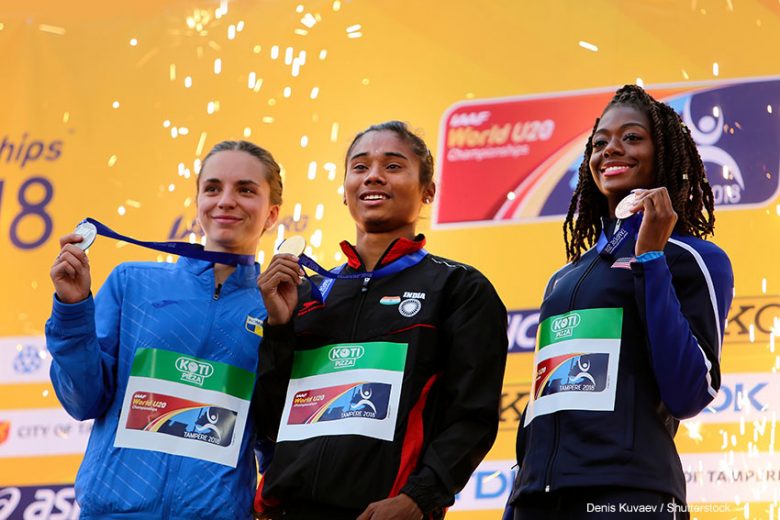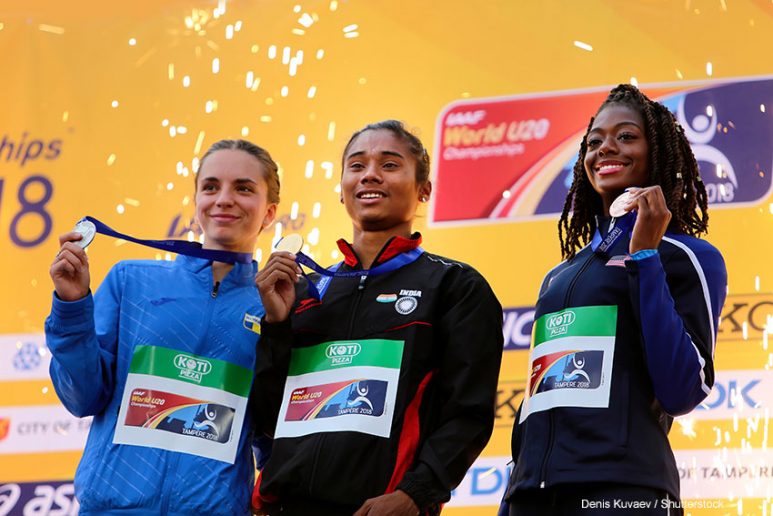By Ayesha Aleem
It has been nearly 20 years since Gurinder Chadha’s, Bend it like Beckham, when perhaps for the first time, Indian families and brown girls everywhere, and the rest of the world too, saw that someone who looks like Parminder Nagra could play professional football. But it was also several degrees removed from the reality of many women in India who saw this character as someone who could only exist in a diaspora community in far away England.
Now, Skater Girl, Manjari Makijany’s debut feature of a girl in rural Rajasthan who learns to skateboard professionally, has just released on Netflix and it’s bringing up many of the feelings that Bend it… stirred but this time, is closer home to an audience in India and still available to worldwide viewers. Ahead of the Olympics in Tokyo this summer, I cannot help but wonder why films in this genre are not produced more regularly, considering what a potent combination sport and entertainment can be, the influence marked particularly on young people.

Playing any kind of sport is not just exercise. Sport can help develop a stronger sense of self and increase self-esteem. Apart from reducing the risk of obesity and diabetes, sports can help women have healthier periods and stronger muscles and bones. Sports can help manage mental health. Team sports are great to make friends and learn positive group dynamics. But in many South Asian families, sports for women still is not a priority. Cultural, social and religious reasons, nearly always underpinned by patriarchy, discourage women either from playing recreationally or competing professionally. And it is precisely why we need more movies about South Asian women in sport.
In Hollywood, women-centred sports movies are not as uncommon, although major international releases are fewer. I,Tonya, the story of competitive figure skater Tonya Harding, released in 2017. There was the Hillary Swank-Clint Eastwood pairing in Million Dollar Baby. A League of their Own still captures imaginations. But the list thins beyond these titles. From India, in recent times, we’ve seen Chak De India, Mary Kom and Dangal. This year, Saina joined the group. But Saina didn’t get nearly as much attention as the others and with Mary Kom, are the exceptions that didn’t rely on a big-ticket male star to carry the film through the box office.
Male-centred sports films about brown men are less uncommon. There have been biopics on some of India’s biggest cricket stars and another scheduled to release soon. Lagaan, which combined cricket and India’s history with British rule, was the third Indian film ever to be nominated for an Oscar in the Best Foreign Language Film category. And a film has been made about the life story of one of the country’s most celebrated track and field athletes, Milkha Singh, who passed away in June 2021 from Covid complications. There is no similar work to document the contribution of PT Usha, India’s star female track and field athlete. What’s interesting but not widely known is Milkha Singh’s wife, Nirmal Saini, who passed away five days before her husband, used to be captain of the national women’s volleyball team.
National Award winning film critic, Sohini Chattopadhyay, frequently writes about the portrayal of women on screen and is currently working on a book about women athletes in India.
“We’re in a moment in Hindi cinema when we’re likely to see more sports films with women,” she says, including one about PT Usha.
She tells Media Diversity Institute of projects in the works like Shabaash Mithu, expected later this year, about the Indian Women’s Cricket team captain, Mithali Raj and Rashmi Rocket, both starring Taapsee Pannu. There was Panga, about a former Kabaddi world champion, Saand ki Aankh, based on a pair of sharpshooting octogenarians and some regional language titles (Saala Khadoos, Dear Comrade, Kony). But out of these films that have been released, none have received the kind of platform that Bend it… had and now, Skater Girl.
Filmmaker, Manjari Makijany, did not set out to make a film about skateboarding, she says in an email interview.
“I wanted to write something simple and yet universally relatable. Skater Girl is a story that hopefully inspires girls to dream and challenge conventions,” she tells Media Diversity Institute.
A few years ago, when she came across a growing skateboarding movement across India that many people did not know about, she started researching the trend with her sister, Vinati Makijany, who also co-wrote and produced Skater Girl. The film was shot as an independent production on a tight budget and was intended for international festivals but many were cancelled because of the pandemic. Netflix released Skater Girl in more than 191 countries, in multiple languages.
Naomi Osaka, who is a four-time Grand Slam winner, recently prioritised her mental health, pulling out of major tennis tournaments, sending a message to people everywhere that it is important to put themselves first and proved what a big impact sports figures can have. It is why we need more stories from around the world in mainstream cinema, featuring characters from diverse circumstances, especially of women of colour playing sport, to show young women and girls they can be anything they want, far beyond the limits society places on them.
And we need these stories much more frequently than 20 years apart.
Photo Credits: Denis Kuvaev / Shutterstock

